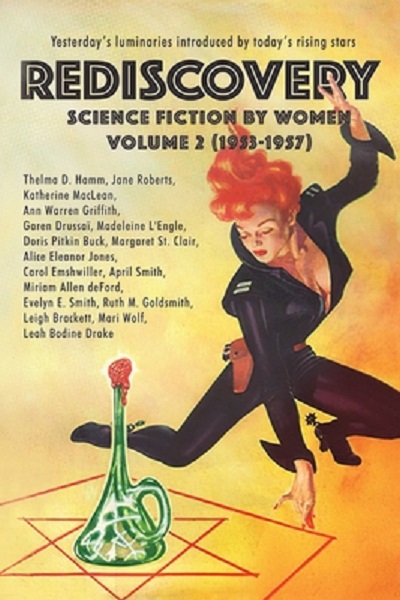Book Review: Rediscovery: Science Fiction by Women Volume 2 (1953-1957) edited by Gideon Marcus
As the introduction by Janice L. Newman points out, women have written science fiction all along. The percentage of them getting published at any given time in the magazines and books waxed and waned, but they were always there. In the period of the 1950s covered in this volume, they averaged about 1 in 10 stories published in American science fiction magazines and there was a trend that they’d write stories that were not so much about square-jawed scientists solving physics puzzles or fighting aliens as just about anything else. Some of it got denigrated as “diaper fiction” by those who preferred the crunchier stuff, but a lot of it was intriguing in its own way.

The Rediscovery series reprints lesser known stories by women; many have never been reprinted before, while others have rare appearances. This second volume is effectively a prequel to the first, which covered 1958-1963. Each story is accompanied by an afterword by a current day author, telling us something of the writer’s life (some have no information whatsoever beyond their name, and others are, outside their work, only known through reports of them accompanying a husband) and what the story means to the new author.
“Games” by Katherine MacLean starts the volume with the tale of Ronny, a boy who’s playing “Indians” and imagines that he’s a dying chief who wants to pass his wisdom on to the young warriors. But Ronny is an esper, and his story connects to Purcell, a dissident scientist who is being starved to death by the government. Another esper helps Ronny process the experience. Perhaps having access to Purcell’s memories will help the child one day.
“The Wines of Earth” by Margaret St. Clair ends the volume in a quiet way. A Napa Valley vintner shows three odd visitors around his vineyard and lets them sample both his own wines, and a few special bottles he’s tucked away. They come from a far more advanced culture, but honor him with a bottle of their own best wine. It’s a bittersweet ending, but with hope for the time we go out to the stars.
Of the pieces in between, my favorite is “Miss Quatro” by Alice Eleanor Jones. Miss Quatro is the perfect housekeeper, and she’s especially good with the children, telling them a wonderful story. Edith Horton appreciates this, and shows it by being a decent employer who shows kindness to her employee. And that kindness pays dividends far beyond what Mrs. Horton would ever guess. It’s one of the happiest endings in the volume, because it could have so easily gone much worse.
Not all of the pieces are fiction. “We Move on Turning Stone” by Leah Bodine Drake is a short poem about Earth and space. “News for Dr. Richardson” by Miriam Allen deFord is a non-fiction essay responding to Dr. Robert S. Richardson’s piece on what personnel would be needed for the first Mars mission. After talking about pilots, scientists, guards and other vital mission personnel, he’d mentioned that the expedition would also want some women along to…umm…basically be prostitutes. Ms. deFord strongly objected to Dr. Richardson’s hidden assumption that only men would fill the aforementioned roles, as though women couldn’t qualify as mission-vital personnel rather than entertainment. She recommended a much more even gender balance, so that free will, not occupation, would determine if any romantic or sexual connections would be made.
There’s a couple of lesser known pieces by famous authors. “Poor Little Saturday” by Madeleine L’Engle is about a “haunted” house inhabited by a witch who helped a young boy survive his childhood, and “The Queer Ones” by Leigh Brackett is a slowly unfolding mystery about a child who doesn’t look anything like his relatives, and illegal aliens.
Content notes: a certain amount of period sexism, racism and ethnic prejudice. The story “Birthright” by April Smith deals with colonialism (on balance, a bad thing in-story) and “Two-Bit Oracle” by Doris Pitkin Buck has child abuse. “The Agony of the Leaves” by Evelyn E. Smith has two women try to force a man’s consent to romantic relationships using magic.
In the back, there are minibios of the women who wrote the afterwords.
Overall, a strong collection of less-known stories that show the range of women working in the field during the mid-1950s. The afterwords are especially helpful in making this a worthwhile purchase. Recommended to science fiction fans, especially those interested in fiction by women or the time period’s literature.

